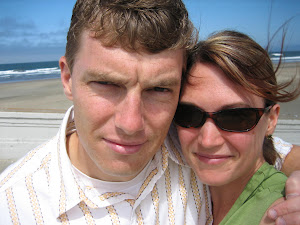Mike and I knew that the first two weeks would be the most difficult - emotionally for us, and physically for Owen and Ellie.
Owen - which means "young fighter" - was named because of his constant activity in utero. On the majority of my ultrasounds, Owen could be seen kicking his little sister. Now that he has made his appearance into the world, he has proven once again that he is a fighter. Owen was ready to be born at 27 weeks. Arms flailing, he cried immediately - a good sign, we were told by the doctors. When babies are born prematurely, one of the biggest problems is the viability of their lungs. Owen never had any major complications. When he arrived in the NICU, he was placed on a C-PAP, an apparatus used to hold the lungs open to make it easier to breathe. He needed no other intervention and has quickly weaned himself away from the C-PAP to a nasal cannula - a total miracle.
Eliot - named after T.S. - also cried immediately after birth, but was less psyched about her early introduction to the world. It took the medical team a lot more pushing and pulling to get her out (obviously smarter than her brother already). The first two days, Ellie did great considering she was so small at birth - 2lbs., 2oz. But on the second night, she took a turn for the worse. Her right lung looked "ugly," and the doctors decided to collapse it. They turned her over on her side, pushing all of her air into her healthy lung, and within two days, her bad lung had fully collapsed. You can't imagine the sight.
After this successful procedure, the doctors did an x-ray of her brain, believing that the trauma she had endured had given her small, underdeveloped brain a hemmorage - otherwise known as a brain bleed. We found out that day that she had suffered a small IVH - intraventricular hemmorage - but that the blood would most likely be reabsorbed by the body without causing any problems in her future development. Two x-rays later, the medical team was no longer worried about Ellie's IVH, and we were ready to move on to the next day . . . and the next test.
Eliot's blood pressure started to become unstable during the end of her second week in the NICU. She was given a medication to control it, but it didn't work. Low blood pressure can also be a sign of a PDA - patent ductus arteriosus. PDA is an opening between two major blood vessels, the aorta and the pulmonary artery. It is common in premature babies and is supposed to close within two or three days of birth - once the heart adapts to life outside the womb. Ellie's heart did not. They treated it with Indocin, and after only one round (they could have done three), it had become so small they didn't think it would affect her at all. And . . . her low blood pressure was tied to the PDA because after its size was reduced, her blood pressure stabilized. Score: three for Eliot, zero for preterm catastrophes.
During Ellie's lung collapse, she was put on an oscillator, which breathed for her. She was also put on a paralytic, a drug to paralyze her so she wouldn't fight the machine that was breathing for her. She just laid there - completely lifeless. By the middle of the second week, she was on a C-PAP - a huge graduation from the oscillator. Mike and I couldn't believe the work this kid had done in the first few days of her life. And while it was so hard to watch her recover, and then see her get hit with another complication, watching her now - breathing room air on her own and sleeping peacefully - is the greatest gift ever. Another total miracle.



No comments:
Post a Comment